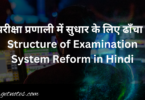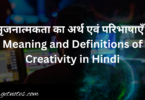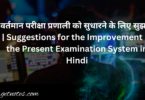
Contents
Elements of Educational Administration
Educational administration is a process, which provides incentive to action, gives direction to activity and energizes effort. It checks wastage and stagnation in the field of education and ensures fullest utilization of effort and resources of men and materials. It supplies the urge to do things and to get them done. It arouses the motives of self-interest, satisfaction, service to others and pleasure of work and achievement. To be successful, it has to be guided by following elements.
(i) Planning
Planning involves the specification of anticipated learning output, learning conditions, and criteria for evaluating results. It also requires a design for verifying learning results and learning conditions. How will the teacher really know whether or not the planned learning conditions were in fact actualized? It is important for teachers to have access to a variety of resource persons during planning activities. Supervisors have a broader understanding of the goals of the school organisation and can help teachers develop and evaluate the specification of the anticipated learning outcomes of their teaching. It is also possible for the system of school organisation to facilitate the planning process through which teachers can share planned learning.
Planning, both long range or long term and short term, is a management technique which has already made a significant impact on educational administration. But the approaches, so far adopted or suggested for educational planning, highlight-several special features, requirements and difficulties: For instance;
a) The search for arguments in favor of allocating more funds for educational development, by justifying such expenditure on grounds of economic growth, seems to be a major pre-occupation with the educational planner;
b) In the absence of quantifiable targets on the basis of consumer demand, the tendency is to fix internal targets in relation to the quantity of products, turned out by the system, rather than the quantity accepted by society into its employment structure;
c) The determination of overall targets, as well as those in respect of different components, is done on a subjective basis depending very heavily on the intuitive understanding and knowledge of a few people.
d) The educational planner proceeds to find ways and means of increasing the output of this system (whether by higher rates of enrolment or retention) without contemplating any significant changes in the organization and the structure of the system, its methods of production or the caliber of its workers;
e) The planner exercises little or no control over the implementation of educational plans and as such the process of educational administration goes on with little contact with planning.
The scope of the college plan may be spelt out as under
(i) Improvement of physical facilities.
(ii) Improvement of teachers and library services.
(iii) Improvement of co-curricular and extra-curricular activities.
(iv) Participation in community programmes, etc..
1. The basic principles to draw up these plans are
(i) The plans may not be grandiose but such as can be achieved with the resources in men and material available with the institution.
(ii) The resources should be utilized to the maximum. It has been found, for instance, that the playgrounds or some classrooms or halls are used only for a very short period in the year. Attempts should be made to put them to the greatest use-may be even for community activities or for inter-college or school complex activities.
(iii) The immediate needs of the institution, should be identified and priorities determined and accordingly the plans be prepared.
(iv) As far as possible no financial implications should be involved in implementation of these plans. If we tie our plans with certain pre-requisites or with more funds, we are not likely to succeed.
(v) Plans could be of long range or of short range. But a periodical assessment of either type of plan is a ‘must’ in order to achieve something tangible.
2. Organisation
We shall need organisations for the implementation of various educational plans. They can achieve better results if they are a happy combination of both formal and informal organisations.
These organisations, particularly informal, should consist of only such members as have an aptitude for the project or the programme. For instance, the work of the dramatic society should be entrusted to the group of people who are interested in it or have the potential for it. But these societies or clubs should be neither quasi-permanent nor purely temporary. In fact, they should become a part and parcel of the college-a formal organisation-and should create a sub-culture of the college and set up traditions which would continue irrespective of the fact as to who is presiding over its destiny.
(3) Coordination
There must be proper coordination of different activities in the field of educational administration. Without coordination there will be overlapping and wastage of energy. Even for the simple project of building a house, unless there is a suitable coordination between the mason, carpenter, laborers, architect and the supply of various types of materials, not much headway can be made in raising the building. Coordination needs advance planning to correlate the activities and tasks in various areas and to seek the cooperation of all the personnel involved. A little slackness or lethargy on the part of even an insignificant worker may jeopardies the whole project and the organisation.
In a secondary school there are a number of jobs to be done which may be of academic, para-academic or of non-academic nature. The school is expected to show excellent academic performance. For this, the entire faculty has to work in close cooperation and to put in concerted efforts. For instance, if the teacher of English does not care to bother about the achievement of a student in other subjects and does his own job with utmost devotion and sincerity the overall performance of the school will not improve beyond mediocrity. Likewise, a zealous director of physical education may keep sports and athletic ‘fans’ too much occupied in these activities at their peril because it is the harmonious development of a person which is the objective of all educational administration.
The coordination, the tasks and the activities of the personnel is a tall job. The principal should keep in touch with each, without causing any unnecessary interference, know their problems and put them on the track whenever any activity seems to be going astray or off the rails. To get the cooperation of the fellow workers is a ticklish affair. The educational administrator must see that on one feels that he or she is left in isolation, nor should anybody be unduly pampered. A smile or a word of cheer can go a long way in keeping people on the right side.
4) Control
When we say that an educational administrator should keep the personnel in good humor to secure cooperation in numerous functions of the school, it does not mean that he should be all soft and allow a laissez faire policy. The attitude of ‘let sleeping dogs lie’ or to allow them to do whatever they like will be a positive obstacle in achieving our goals.
Guiding or directing an activity and also evaluating it is a very important part of the administrative process. Various elements of administration, that is, planning, organisation and coordination need to be checked up whether they are in order and are functioning at their best. Control is required in all spheres of the educational process setting up the aims and objectives, formulation of procedures and techniques, providing equipment’s, finance, public relations, etc – to achieve our objectives. The main purpose of exercising control is to bring about improvements both qualitatively and quantitatively and to contribute to the realization of the goals.
Control is exercised through power technique: the evaluation. Legal sanctions and social customs give the authority to control; techniques help us in its exercise and evaluation keeps us alert. The techniques of control are the policies. The budget, auditing, timetable, curriculum, personal records, periodical reports etc. serve as a very good measure to keep all concerned on the right track.
Educational control involves largely the human element. Men and women, by and large, do not cherish the idea that they are being controlled. A good administrator while finding faults does it in a manner that it appears as a suggestion and not a command.
Human control is very intriguing. It could be feudal control where the domination is of one man. In this, the relationship is of dependency. The decision is made at the top and the people at the other levels have only to conform to what the boss requires. Bureaucratic control stresses the importance of rules and impersonalisation of admin iteration. The different roles in this type of control, work in isolation and are independent of one another. Managerial control emphasizes on getting the maximum of the outputs oblivious of the human element.
For an educational administrator the most satisfying control is the ‘institution building’ control. It is human every inch. The relationship here is of collaboration, homogeneity of thinking, individual autonomy, mutuality and of working together and not remaining in isolation. There is no attempt to capture power but to control the situation to enable the people to be creative and productive. The emphasis in this type of controls is on evolving new and unconventional ways of resolving difficulties and solutions to problems thereby creating new models for the future.
- Differences between Educational Administration and General Administration
- General Administration and Educational Administration
- Nature of Educational Administration
- Scope of School Administration
- Definitions of Educational Administration by Different Scholars
- Definitions of Educational Administration by Different Scholars
- Meaning of Educational Administration
- Principles of School Organisation and Administration
- Aims and Objectives of School Organisation
- School Organisation | Meaning of School Organisation | Meaning of School |Meaning of Organisation
Disclaimer






